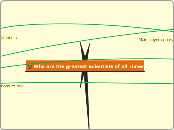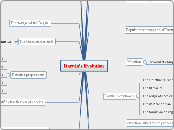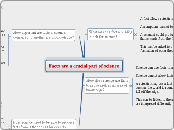Who are the greatest Scientists of all Times?
Other Questions to consider
Repercussions of Galileo's trial on Scientific inquiry in Europe?
Are Science and Religion Compatible or destined to clash?
Who controls Scientific Inquiry?
How much latitude should we give scientists?
Questions to ask
What makes science different from other ways of investigating the universe?
Science uses Scientific Method
What is "good" Science as opposed to "bad" science?
Good sciene differs from bad science in the sense that it's based on empirical evidence, uses Scientific method and can be fasifiable while Bad Science can't be retested of proved wrong
What is Science?
A method that uses reliable knowledge to investigate nature and how the univers works
Who is the Scientist?
A Person who always investigates nature, asks questions about it, from a hypothesis trying to find new inventions and prove them right using experimentation
Those who claim to be "Scientists"
Stanton Friedman
Richard Hoagland
Zahi Hawass
Graham Hancock
John Anthony West
Main players on every one's list
Galileo
What is the "Science" that he did?
Publish the results
Experiment
Test the observation
Observe and Hypothesis
What makes him a "great" scientist?
Motion of an object, time, and distance
Sharpenning the telescope by 3 times
What is it that he did that makes him "great"?
Martyr for scince who was accused of heresy
He changed how people viewd and onderstood the world and their place in the universe
Who was he?
Professor of mathematics
Italian
Isaac Newton
Albert Einstein
Aristotle









